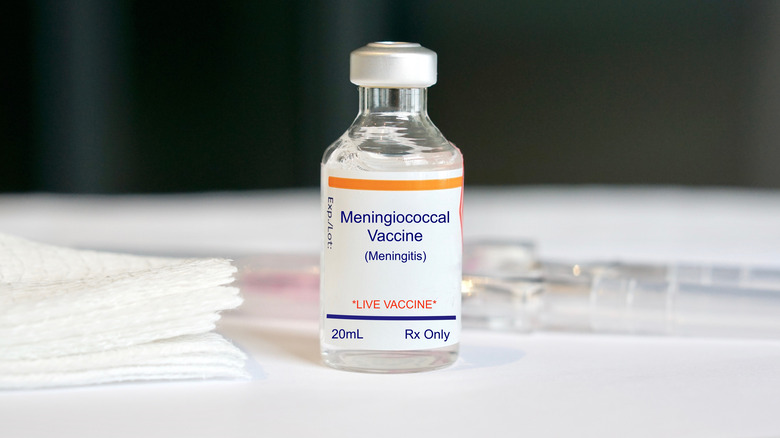Meningitis Vaccines Could Protect Against More Than You Think
Meningitis is a serious medical condition in which the fluid lining around the brain and spinal cord becomes swollen and inflamed and with symptoms including headache, fever, and neck stiffness (via Mayo Clinic). While the disease can be caused by bacterial, fungal, parasitic, or viral infections, the U.S. Centers for Disease Control and Prevention (CDC) advises vaccination during early adolescence and at age 16 to protect against various strains of bacteria responsible for the condition (via Kids Health).
Roughly every one in 5 people who contract bacterial meningitis are likely to experience severe health complications, reports the World Health Organization (WHO). The meningitis vaccine can help protect against serious long-term complications and death, but additionally, a new study led by Dr. Winston Abara of the CDC's National Center for HIV, Viral Hepatitis, STD, and TB Prevention has determined that the meningitis vaccine also can help prevent the sexually transmitted disease, gonorrhea (via Healthline). According to the Cleveland Clinic, nearly 50% of all gonorrhea infections are found in people between the ages of 15 and 24. Common symptoms of gonorrhea include painful or burning sensations while urinating, throat infection, and discharge that appears white or yellow in color.
Meningitis vaccine may reduce the risk of gonorrhea
Like bacterial meningitis, gonorrhea is a bacterial infection (via Cleveland Clinic). A study published in April 2022 in The Lancet examined the relationship between meningococcal vaccination and rates of sexually transmitted infection. Looking at health data from 2016 to 2018 of young people ages 16 through 23 across New York City and Philadelphia, researchers compared health outcomes of those who had been fully vaccinated against meningitis with two 4CMenB vaccine doses, those who had received only one dose of the vaccine, and those who were unvaccinated.
It was discovered that vaccination against meningitis reduced one's risk for gonorrhea infection by 40% in fully vaccinated individuals, and by 26% in those partially vaccinated (via Healthline). Experts believe this is due to the fact that both types of bacteria share a similar makeup. Virologist and laboratory director of the Nevada Fertility Institute Dr. Cindy M. Duke told Healthline, "The meningitis bacteria and the bacteria that causes gonorrhea belong to the same family of bacteria. So, while they're different, it's like having a brother and a sister." Lead study author Dr. Abara believes these research findings have the potential to aid in the prevention of future gonorrhea outbreaks.


